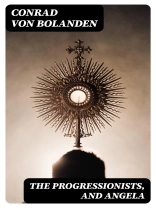In ‘The Progressionists, and Angela, ‘ Conrad von Bolanden intricately weaves a narrative that explores the burgeoning tension between tradition and modernity in 19th-century Europe. The text utilizes a rich, descriptive literary style, marked by its psychological depth and character-driven storytelling. Central to the novel is the dichotomy between progressive ideals and conservative values, articulated through the intertwined lives of its protagonist, Angela, and a diverse cast of progressionists. The novel prompts readers to reflect on the social changes of the era, reinforcing its relevance within the broader context of literary movements seeking to address the complexities of human experience amidst evolving societal norms. Conrad von Bolanden, a prominent figure in German literature, was influenced by his own experiences navigating a rapidly changing society. Born into a period of immense political upheaval and cultural flowering, Bolanden’s works often reflect his trials with identity and societal expectations. His adept portrayal of character psychology and his nuanced thematic concerns have positioned him as a pivotal voice in understanding the subtleties of European modernity, making ‘The Progressionists, and Angela’ a significant addition to his oeuvre. This compelling narrative beckons readers who are keen to explore the intricate interplay of ideology and personal agency. With its thought-provoking themes and vivid characterizations, this novel invites contemplation on the paths of progress and the legacies of our choices. Ideal for scholars and casual readers alike, ‘The Progressionists, and Angela’ stands as a profound examination of the human condition in the face of sociocultural evolution.
Circa l’autore
Conrad von Bolanden, born Joseph Bischoff on May 29, 1828, in Bolanden, Germany, was a Catholic priest and a prolific 19th-century German writer who focused on themes reflecting his staunch Catholicism and conservative political views. He adopted his pen name from his birthplace, embodying a deep connection to his roots. Bolanden’s literary contributions were primarily aimed at the popular market, and he became well-known for his historical fiction and polemic works. Among his many writings, ‘The Progressionists, ‘ a work that critiques the cultural and political progressive movements of his time, stands out for its keen observations and its reflection on the challenges facing traditional social and religious structures amidst change. Similarly, ‘Angela’ takes readers through a narrative that intertwines personal faith with the broader societal currents, presenting a perspective that bolsters the Catholic viewpoint within the socio-political debates that marked the era. Conrad von Bolanden’s style is characterized by a didactic approach, as he utilizes his storytelling to underscore moral and religious lessons within historical and contemporary contexts. His books offer a window into the 19th century struggles between secularism and religion, elucidating his defense of the Catholic Church during Kulturkampf, the conflict between the Prussian state and the Catholic Church. Despite being less known today, Bolanden’s works were influential in his time, contributing to the literary and cultural discourse that shaped the identity of Catholic literature in Germany during the latter part of the 19th century (Lins, 1910; Ott, 1912).












